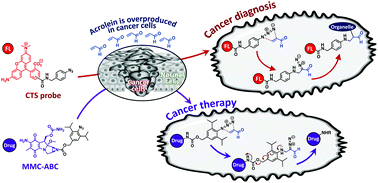Biofunctional chemistry and reactivity of biogenic acrolein for cancer diagnosis and therapy
Abstract
Acrolein holds excellent potential as a biomarker in various oxidative stress-related diseases, including cancer, Alzheimer's, Parkinson's, and inflammatory disorders. Consequently, a direct method to target and visualize acrolein in biological systems might be essential to provide tools for diagnosis and therapeutic purposes. Previously, we discovered 1,3-dipolar cycloaddition between aryl azides and acrolein, which proceeds without a catalyst to give α-diazocarbonyl derivatives. The reaction proceeds with high reactivity and selectivity even under physiological conditions. We have successfully utilized the reaction as a robust method for detecting acrolein generated by cancer cells. This review discusses the utilization of the endogenous acrolein reaction with aryl azide to (1) distinguish breast cancer from normal tissue during breast-conserving surgery and (2) treat cancer through selective prodrug activation in a mouse model without causing adverse effects. The methods have potential clinical application for breast-conserving surgery and are highly advantageous for cancer therapy.

- This article is part of the themed collection: Chemical Communications HOT articles


 Please wait while we load your content...
Please wait while we load your content...